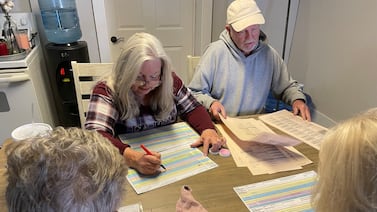Votebeat is a nonprofit news organization reporting on voting access and election administration across the U.S.
This news analysis was originally distributed in Votebeat’s free weekly newsletter. Sign up to get future editions, including the latest reporting from Votebeat bureaus and curated news from other publications, delivered to your inbox every Saturday.
Donald Trump is leaving little doubt about who’s president right now, but in one corner of the country, a lawsuit is helping to fan skepticism about the results of the 2024 general election.
The case against Rockland County, New York, claims that there were irregularities in the county’s vote tallies, judging in part by what the plaintiffs characterize as statistical anomalies — notably the mismatch in support between Democratic Sen. Kirsten Gillibrand and the person at the top of the party’s ticket, Vice President Kamala Harris. Gillibrand won the suburban county by about 8,000 votes, while Harris lost to Trump by more than 17,000.
The plaintiffs say it’s a suspicious pattern of ticket-splitting that suggests vote-rigging or errors, an echo of the spurious claims made by Trump allies when he lost several swing states in 2020. They want the court to invalidate the Senate and presidential election results and order the county to redo the election.
A state court dismissed most of the plaintiffs’ requests in March, but Justice Rachel Tanguay is allowing discovery in the case to proceed after the county Board of Elections acknowledged it might amend its response. (The original plaintiffs included a third-party senatorial candidate, two voters, and an activist group that has long opposed some voting machines, though only the activist group remains.) So the case continues for now.
Unlike Trump in 2020, Harris herself hasn’t amplified the lawsuit’s claims about 2024. And many experts say there’s no reason to question the validity of the election results, in Rockland County or elsewhere.
In a recent blog post, Charles Stewart III, an MIT professor and well-known election expert, carefully broke down the precinct-level data for Rockland County and said he found no signs of errors or manipulation.
Examined closely, Stewart wrote, the anomalies are mostly centered on a small number of polling locations in the town of Ramapo. There, he wrote, many members of Orthodox Jewish communities supported Gillibrand, but declined to support Harris, which explains the gap.
“The Rockland County election results in this case are a nothingburger,” he wrote unequivocally.
Nonetheless, the lawsuit’s claims have begun circulating online, and some commenters are pointing to them to suggest that something may be wrong with the election’s results more broadly.
We’ve written about this type of election denialism as a problem on the right, and it remains true that Republican leaders, from the president all the way down to municipal officials and candidates, have pushed election conspiracy narratives far more than Democratic leaders. Across the country after the 2020 election, Republicans went to extraordinary — in some cases, extralegal — lengths to delegitimize Joe Biden’s victory, and some still haven’t quit.
But the response to the Rockland County case shows that there’s an appetite for it on the left as well. A recent YouGov poll found that 41% of voters who reported casting a ballot for Harris in 2024 did not believe that Trump “legitimately won the election.” And claims about “statistical anomalies” in the election results — a common theme of the conspiracy theories about Trump’s 2020 loss — are increasingly being used by those who want to sow doubt in the integrity of the 2024 election and, in some cases, Trump’s victory specifically.
Which brings us to why this matters beyond the borders of Rockland County — and to leaders of both parties.
A new report from the States United Democracy Center, shared exclusively with Votebeat, shows that people are more likely to vote when they are confident that their ballots will be counted as intended. That’s long been the theory, but thanks to this study, it’s now backed by validated voter file data. States United matched survey responses about voter confidence with actual turnout records and found a clear, consistent pattern that crossed partisan lines: Confidence drives participation. Doubt keeps people home.
According to the research, if all voters had felt confident their vote would count as intended in 2024, turnout might have increased by as many as 5.7 million people.
The study is “concrete evidence of the impact on voter participation,” said Kelly Rader, States United’s research director. It’s the “so what.”
And that applies to Democrats as well. Even now, they haven’t been nearly as active in circulating election misinformation as Republicans have been since 2020, but when they do, they can expect the same effect to kick in: Supporters get disillusioned and stay home.
“Americans overwhelmingly believe it’s more important that every legal vote is counted than that their preferred candidate wins,” the States United survey found. That’s a good thing. But it only works if everyone stops playing fast and loose with election integrity claims.
So here’s the takeaway: If parties want to win elections, they have to stop telling voters the system is rigged every time they lose. Because when you chip away at people’s trust in democracy, you’re chipping away at your own turnout, too.
Clarification, July 14, 2025: This story has been updated to clarify that some plaintiffs have withdrawn from the case since it was first filed.
Jessica Huseman is Votebeat’s editorial director and is based in Dallas. Contact Jessica at jhuseman@votebeat.org.





